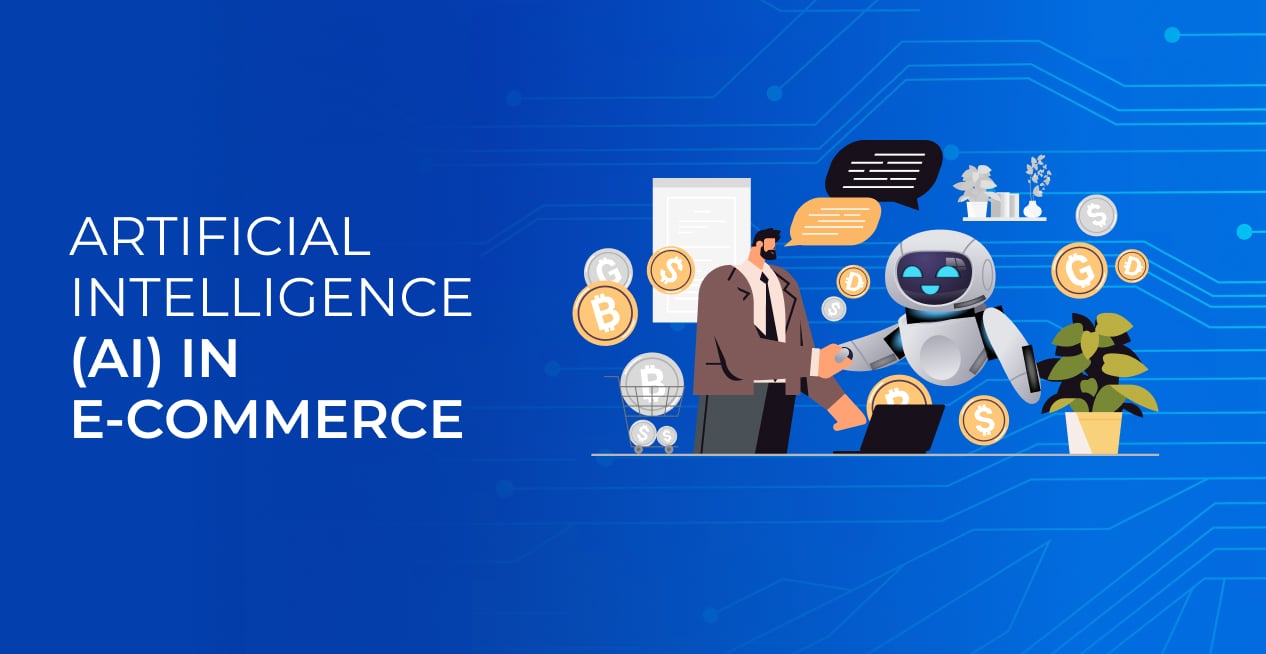-
An Introduction to AI in eCommerce
-
What is eCommerce, and How can We use AI with it?
-
Roles for AI In eCommerce
-
What is the Market Size of AI in e-Commerce?
- 5 Major Applications of AI in eCommerce
-
Importance of AI in the e-Commerce Landscape
-
e-Commerce needs AI
-
Why is AI the future of e-Commerce?
-
Business Benefits of AI-Powered Apps
-
Success Stories of AI in eCommerce
-
Final Note on AI in eCommerce
An Introduction to AI in eCommerce
AI, as we all know, is assisting the tech world in becoming smarter and more intelligent than ever. It is making a profound impact on the e-Commerce industry, particularly in the integration of AI in ecommerce. In fact, by 2032, the e-Commerce AI market is projected to reach up to $45.72 billion and grow at a CAGR of 18.45% from 2023- 2032.
This eccentric technology is intensifying e-Commerce businesses with its potential to perform work as intelligently as humans. Moreover, they multitask and handle plenty of customer & business data. It also intensifies the overall user experience of an e-Commerce website. In this blog, let’s look at how e-Commerce is exponentially growing because of the implementation of Artificial Intelligence in various facets.
What is eCommerce, and How can We use AI with it?
e-Commerce is an electronic host allowing you to purchase or sell products on an online platform over the internet. e-Commerce typically involves buying products & services and enables users to shop online and pay. It saves time & money for customers and enterprises, with greater transactional efficiency and improved experience.

Roles for AI In eCommerce
AI in e-Commerce industry outperforms multiple roles. AI has the ability to understand and analyze the personalization of the customer shopping experience. It acts as a catalyst to increase sales for e-Commerce and optimize various operations. AI also helps businesses to analyze customer data from purchase history and browsing activity. This frames a predetermined outline for recommending the customer with their preferences, leading to more customer satisfaction and conversation. Apart from this, AI chatbots resolve the real-time queries of customers, 24/7.
The role of AI for e-Commerce continues beyond this; AI optimizes various operations of e-Commerce businesses. It predicts demand by analyzing large data sets, improving inventory management, and optimizing logistics and supply chain management. AI also helps improve marketing strategies by analyzing customer data and predicting what customers like and which marketing campaign can generate more sales.
These are a few roles of AI where it turns the tables by being more sophisticated and intelligent to solve complex workloads of humans more efficiently. There are many AI e-Commerce Platforms to increase sales and to understand your customers. This indicates that AI’s future in the e-Commerce industry is way more promising than we can ever imagine.
What is the Market Size of AI in e-Commerce?
AI is dominating the e-Commerce industry with a potential market size of USD 5.1 Billion in 2021 and is projected to reach USD 16.5 Billion by 2030, growing at a CAGR of 14.8% from 2023 to 2030. AI embeds transformational features in e-Commerce applications like image search, re-identifying potential customers, customer-focused search, visual assistants, and big data analytics, driving the market share.
The AI-enabled e-Commerce solutions are expected to grow and be driven by technological improvements such as cloud-based platforms, reduced manual errors, ML-based applications, advanced technologies, AI support chat boxes, and government support for the R&D of AI-based platforms. Moreover, the recent pandemic wave COVID-19 has impacted the AI-enabled e-Commerce solutions market with the exponential need for warehouse automation and management. The market for AI in e-Commerce is predicted to grow significantly.
5 Major Applications of AI in eCommerce
When you look forward to implementing this unique technology in your business operations, here are a few ways to apply AI technology to improve your operations and customer satisfaction. Gain a competitive advantage by applying these AI applications to your e-Commerce business.
1) Active Chatbots to resolve customer queries 24/7
With an AI-programmed set of popping-up, Chatbots on the e-Commerce website engage the customers to input their queries. This makes the customer experience worthwhile as it becomes a communication pathway irrespective of the location. This feature helps to ask relevant questions with a prompt response of courtesy.
There is a thin line between asking a query on the chatbot and purchasing decisions. The customer asks about the product when they are interested. Prompt replies help to make a buying decision. On the other hand, if there is a delayed response to the queries, they may end up losing the customer.
2) AI takes up mundane tasks like handling and processing big data
AI takes up the charge of handling and processing a lot of data daily, which are mundane tasks for humans. There must be a situation where there are chances of human errors, but there are no chances of such mistakes or errors when AI is operating.
AI helps in managing the product database information such as;
a) Average sales daily
b) Record of purchases
c) Maintaining inventory level
d) Goods returned
e) Recording purchasing patterns & customer pattern
f) Count the total number of orders
g) Estimating the total number of deliveries
Handling such tasks can be tedious, time-consuming, and definitely prone to human errors. But Artificial Intelligence handles, records, and organizes, making them more insightful.
3) Protective shield of privacy and cyber security
In today’s technological landscape, many e-Commerce websites involve buying and selling products. This sometimes allows hackers and cyber criminals to access customers’ sensitive information. There is a higher chance of hacking or stealing sensitive data from an e-Commerce website. This situation can mislead your business in the wrong direction hampering its reputation.
e-Commerce businesses can use Artificial Intelligence to enhance and protect their websites. AI can help websites detect fraudulent activity, prevent data breaches, and ensure websites and apps are secure to enable customers to make online payments safely.
4) Predicts and generates sales & market trends
e-Commerce businesses can leverage Artificial Intelligence to forecast sales and marketing trends. This is possible by using the following:-
a) Looking at the pre-history data
b) Knowing the latest & previous trends
c) Analysing the data
This analysis is beneficial to business owners enabling them to boost their operations. It also facilitates them with deeper insights and allows them to maximize the allocation of resources to help them thrive and drive sales and revenue volume.
5) Detecting and filtering fake reviews
Negative comments about the product can turn off customers from buying the product. Sometimes people try to bring up ill motives to forge reviews and make a business lose its customers, reduce its sales volume, and operate at a loss.
Artificial Intelligence, fortunately, has the potential to tackle and handle the fake reviews
that negatively influence the customer’s buying decisions. It can identify fake reviews and help to remove them from the e-Commerce website, ultimately allowing only genuine and legit reviews to appear on the site.
Importance of AI in the e-Commerce Landscape
Artificial Intelligence submerges itself into all aspects of our life. Gartner reported that in the last four years, the number of businesses fostering AI has increased by 270%. There are still a few prevailing misconceptions about AI that it is a contemporary branch of study, but it has existed for the last 7 decades.
Every business needs a crucial platform called the ‘e-Commerce’ website to compete in the market. To maximize business revenue, enterprises set up online businesses. This revolutionary technology was in an upward surge during the pandemic when we were immersed in the internet world. This led businesses to embrace digitalization and improve sales.
Businesses wanting to enter the E-Commerce arena must know that Artificial Intelligence is becoming a substantial part of it. It boosts engagement and interaction with digital footprints, improving overall efficiency and productivity in operations.
Desiring to stand out in the market? Build and design an e-Commerce Business with e-Commerce Website Development
e-Commerce needs AI
e-Commerce is taking over the world with its impeccable capabilities to ease operations. In this tremendous market growth, businesses need technology that goes beyond to help them with their online business. Artificial Intelligence is an intelligent and sophisticated technology that fulfills all e-Commerce needs. There are many reasons which justify that e-Commerce needs Artificial Intelligence. It recommends products uniquely tailored to the customers’ needs, keeps the business online & functioning, and automates various things like product recommendations, loyalty discounts, and low-level support. Moreover, it allows users to use conversational language or images just like while interacting with a person.
Why is AI the future of e-Commerce?
Artificial Intelligence is improving e-Commerce businesses in multiple ways. It’s a matter of fact that technologies that benefit humans will thrive with more improvements and sound features in the future. AI is better at understanding consumer behavior, considering market demand and preferences. Due to ML and AI, businesses hold important information and customer data.
Business Benefits of AI-Powered Apps
Deep learning is a science that teaches machines to recognize and apply knowledge to solve complex queries and to make interactions personalized and smooth. The same applies to e-Commerce businesses, Mobile app developers, and marketers. They need to understand user behavior closely. The few business advantages of using AI apps are:-
- Better & quick search
- Streamlines communication
- Offer intuitive yet personalized user experience
- Facilitates working for prolonged hours without compromising efficiency
- Increases conversation UI
- Improves daily operations
A few examples of AI-Powered Mobile Apps are as follows:-
a) Siri
b) Fyle
c) AI in mobile gaming applications
d) Recommendation Apps
e) Nutrition and Health Apps
Success Stories of AI in eCommerce
Here are success stories of AI implementation in e-Commerce as well as strategic direction Which will help you to introduce AI in your e-Commerce business.
1) Amazon
Amazon uses an anticipatory shipping model to determine which items are likely to be purchased and when customers will need them. This shortens the search process and speeds up the transaction. Amazon uses AI to determine the optimal price for each product, while predictive analytics helps the company enhance product sales and profit margins. Prices are modified based on site activity, rival prices, availability, previous order history, and anticipated profit margin.
2) Starbucks
Starbucks has unveiled a virtual assistant to aid customers with placing online orders and making payments through text or voice. Customers can submit repeat orders to a specific coffee establishment using Starbucks Reorder abilities for Amazon Alexa. Starbucks has identified 13 million Reward Programmed members, 8 million Online Payment Preference consumers, and 1 in 3 Mobile Order & Pay users. By extracting meaningful insights into customer behavior, Starbucks was able to create tailored recommendations for its clients.
3) Stitch Fix
Stitch Fix, which launched in 2011, revolutionized online shopping. It gathers customer information about their style preferences and links them to stylists and an AI with relevant skills. The distinctive style chosen by the buyer is the final product.
Stitch Fix leverages information gathered on customer preferences to spot trends in clothing. Color, arm length, and neckline characteristics all have a role in style. By selecting the best warehouse location and determining the best path to ensure that all goods are picked at once, AI is used to streamline operations and logistics.
Final Note on AI in eCommerce
The integration of Artificial Intelligence (AI) into the e-Commerce industry presents a transformative shift, enhanced customer experiences, streamlined operations, and unprecedented growth potential. As the market continues to evolve, businesses must embrace AI to remain competitive and capitalize on its vast capabilities for sustained success.
For businesses seeking to harness the power of AI in eCommerce, Reach OpenXcell – The best e-Commerce Solutions provider for your business! With our expertise and tailored solutions, we empower businesses to thrive in the digital marketplace and unlock new avenues for growth.









